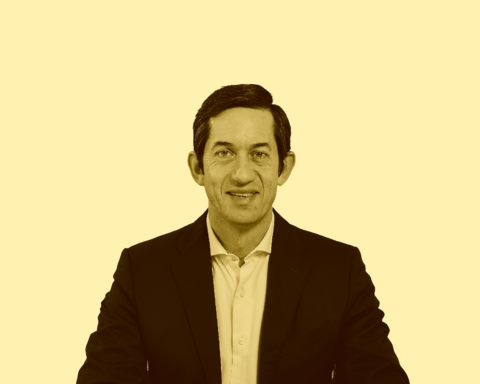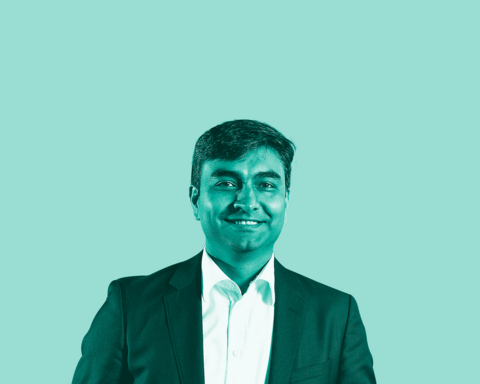
Published
Key topics
Professor Francisco Veloso offers his take on the future of higher education and tells us why it isn’t enough to simply preach about the modernisation of business
Throughout his career, Professor Francisco Veloso, Dean of Imperial Business School since 2017, has wanted to answer one question: what is the best way to create economic and social impact from the science and technology that's generated in universities? So, it’s no surprise he found a home at Imperial.
“Being at Imperial, where science and business are so perfectly aligned, was no accident,” he says. “I don't think there is any other institution that is as well-equipped to be working at the intersection of business, society and technology.”
Initially studying natural sciences, specifically applied physics, Dean Veloso quickly discovered a passion for innovation and completed a PhD at MIT in Technology Management & Policy. This gave him the opportunity to pursue the study of innovation and connect it to entrepreneurship.
“I very much enjoyed doing research, and it was my interest in finding answers to policy and managerial questions related to innovation and entrepreneurship, that led me to academia.”
Intellectual leadership
Translating academia into impact was a priority for Dean Veloso when he took up the role, and it became one of the defining features of his first term leading the Business School.
This focus was reflected in the results of the Research Excellence Framework 2021, in which the School was named as a leading business school for research, placing second among all the management and business schools in the UK, and first for research environment.
“One of the most significant achievements over the last few years is the evolution we've had in our academic capabilities by increasing the size of our faculty and, with it, our ability to generate high-quality and high-impact research.”
We, at the Business School, also need to be transforming and creating a diverse and inclusive environment
Reappointed for a second term as Dean in 2022, he plans to continue growing the Business School’s reputation as an international force for intellectual leadership, looking at the important societal problems the School can tackle together with Imperial over the next five years.
The fruits of this labour can be seen, he says, in cross-College projects in which the School is a leading player, including I-X, which provides a collaborative environment for research, education and entrepreneurship across artificial intelligence, data science and digital technologies.
Meanwhile, the work of the new Institute for Deep Tech Entrepreneurship aims to tackle some of the world’s major challenges, such as climate change and developing sustainable food and water systems, using technology that exists in universities around the world. Some of these issues are already being addressed by the Business School’s other major research centres, including the Centre for Health Economics & Policy Innovation and the Centre for Climate Finance & Investment.
“The groundwork for these projects has been built over the last few years, but it's really coming to fruition now.”
The future of higher education
Under Dean Veloso’s leadership and guided by his expertise in innovation, the Business School has developed a culture where experimentation is encouraged. This appetite for trying out new ideas has resulted in successful tech spinouts from the School’s Edtech Lab, including online courseware publisher Epigeum and online education company Insendi.
Technology will continue to play a crucial role in the educational advances Dean Veloso is introducing to the School, particularly when it comes to the impact of a hybrid world on the learning environment. Part of this, he says, involves continuing to develop the social side of learning and offering a meaningful digital community.
“We're social beings. We like to be together, laugh together, drink together, tell jokes together, cry together, learn together... This is much harder to do digitally. So, how do you do continue to do that – and combine the digital with the physical learning side of things?”
Another key focus for Dean Veloso is transitioning to an increasingly inclusive and diverse environment. One way he has started to address this crucial issue is with key initiatives, such as the School’s Diversity Committee, as well as the launch of a Student EDI Strategy and award-winning Working in Diverse Organisations course.
Being at Imperial, where science and business are so perfectly aligned, was no accident
The goal is to ensure staff and students can benefit from working and studying in a more diverse-aware organisation.
"This is the beginning of a journey, and I am aware that there is still plenty for us to learn and implement. I also fully recognise that a diverse, engaged and supportive research and teaching environment is central to our ability to truly benefit business and improve society," he says.
“Business schools, certainly ours, will be crucial in helping the wider business world move into the future, a more sustainable one, and a more diverse one. When it comes to equality, diversity and inclusion, it’s not enough to engage with business and society on their transformations. We, at the Business School, also need to be transforming and creating a diverse and inclusive environment.”
These efforts, he says, will also be valued and recognised by the broader community, especially younger, socially aware students.
"They will want the university to reflect their values and views. We cannot be a beacon for the students – and prepare them to be agents of change in broader society – if they don't see change happening in their own university.
“We need to show that we’re preparing for the future now."


